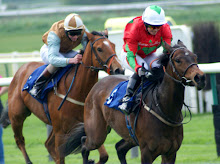Moon Over Miami, a decent horse in his own right and no forlorn hope for The Arkle at Cheltenham in March, looks like gaining a certain notoriety as a result of Derren Brown's programme entitled 'The System'. The horse put in a below par effort at Sandown last December, trailing in fourth of the five runners; that appeared to have busted Brown's system and left our our humble on-course punter £4000 out of pocket.
Of course, there never was any system. When an illusionist tells you he has a system for the horses, naturally you're going to be sceptical. In a nutshell, Brown had contacted a large number of individuals, sent them different selections for carefully selected races, resulting in one individual believing this man had a 100% guaranteed method of picking winners.
I'm kicking myself as I didn't videotape the programme. I thought it would be worth calculating very roughly how much hard cash Channel Four had pumped at bookmakers to create this illusion; you will have noticed, at the end of the programme, a credit appeared thanking all who had taken part and saying something to the effect that all losing bets had been refunded.
I'm sure there will be somebody out there who will have chronicled this in more detail; here's my take. A feature of the races chosen was the fields were generally small in size; Naunton Brook's victory over fifteen adversaries at Carlisle was an exception. For the purpose of my calculations, I'll assume each race had six runners.
Brown told us he'd initially contacted 7776 (6x6x6x6x6) random individuals, sent them a selection and told them to watch the race but not have a bet. The six runners in the field were divided between the 7776 random observers; 1296 potential punters would have watched their horse win. This has cost Channel Four nothing.
We now have 1296 players who are told to have a small bet on the next selection - let's say £5 - 1296 x 5 = £6480; 216 players will have a winner. Losing bets = 1080 x 5 = £5400.
216 players increase their stake to £20 - total wagered = £4320, with 36 winning. Losing bets = 180 x 20 = £3600.
36 players bet £50 - total wagered = £1800, with 6 winning. Losing bets = 30 x 50 = £1500.
6 players bet £150 - total wagered = £900, with just one winner. Losing bets = 5 x 150 = £750.
At Sandown, the final race, our top punter bets £4000 on Moon Over Miami. The horse disappoints (many say he needs a left-handed track, although the trainer does not necessarily agree). Our single mum appears to have lost £4000; but the sting in the tail is that Mr Brown has stuck the £4,000 on the actual winner, Marodima. So, you'd say the TV company has bet all the five actual runners to the tune of £4000. One winning bet but four losing bets @ £4000 = £16000.
Total losing bets = £5400+£3600+£1500+£750+£16000 = £27250.
Of course, this is just a fraction of the sum a TV company might charge just one company to advertise their wares during the commercial breaks that interrupted this particular programme. Another apparent irony was the use of totesport's personable Gary Wiltshire as the bookie with cigars who couldn't fail to run off with punters' dosh - regular racegoers will be well aware that Gary used to run his own bookmaking business...
Saturday, February 02, 2008
Subscribe to:
Post Comments (Atom)







No comments:
Post a Comment